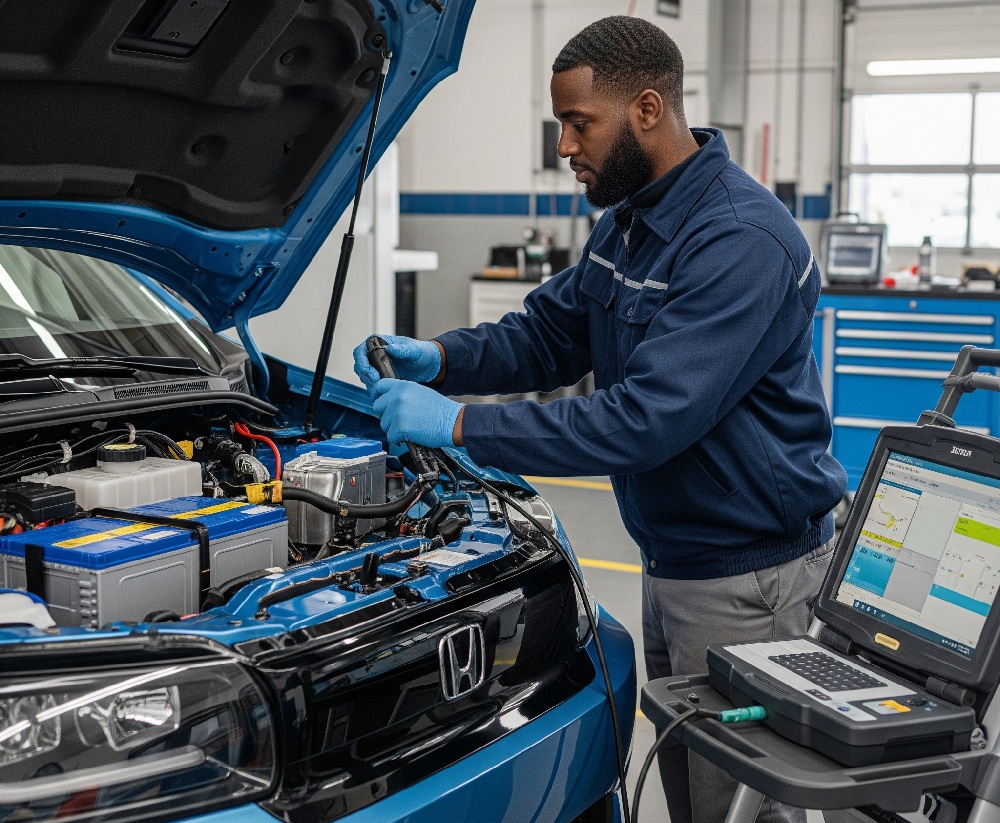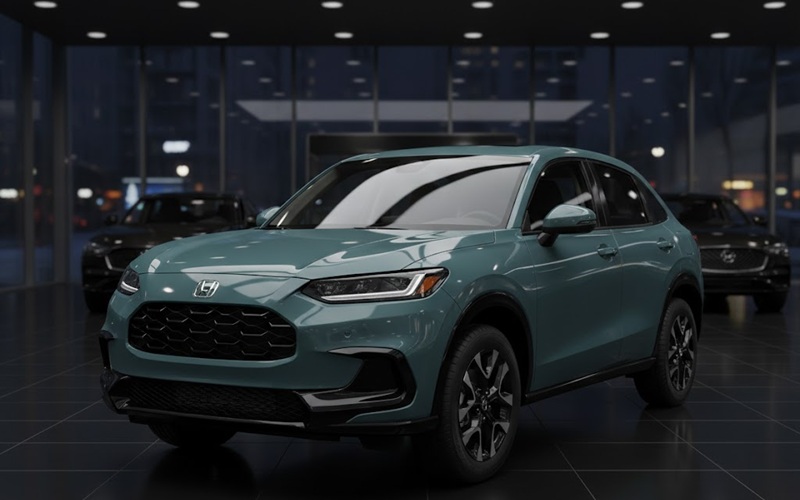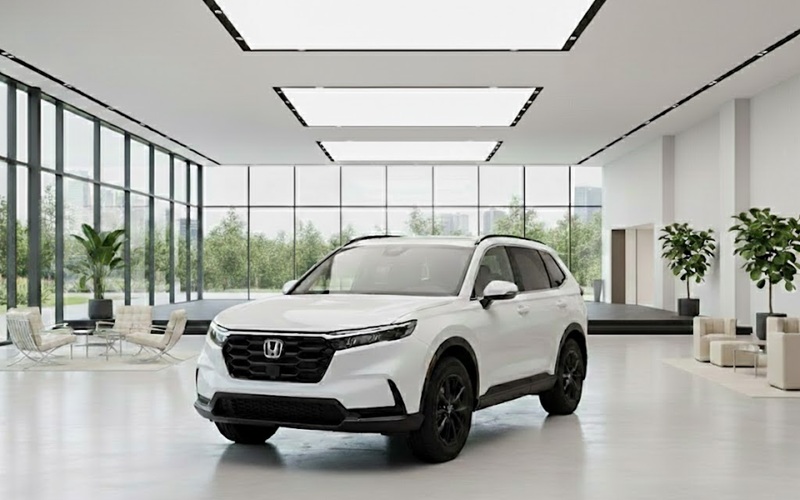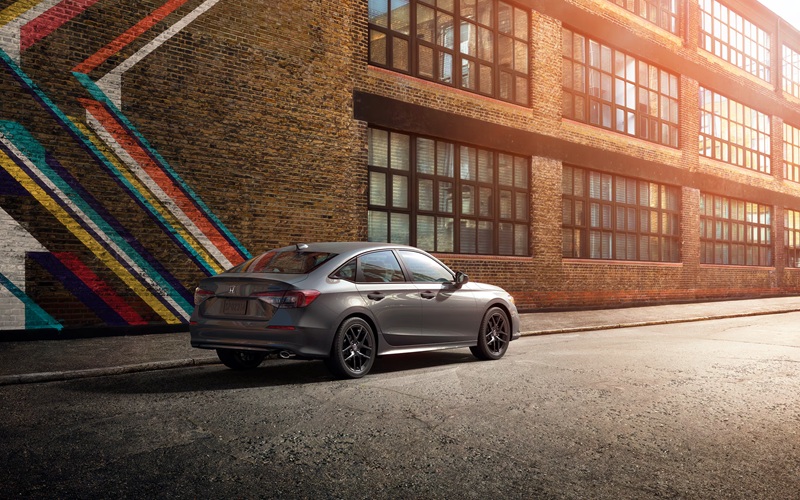As more drivers embrace environmentally conscious transportation options, Honda has emerged as a leader in the electric and hybrid vehicle market. With an expanding lineup of innovative hybrid models, including the Civic Hybrid, CR-V Hybrid, Accord Hybrid, and the new all-electric Prologue, proper maintenance has become essential for maximizing the performance, efficiency, and longevity of these sophisticated vehicles.

The Honda Electrified Lineup
The Honda commitment to electrification is evident in its diverse range of hybrid vehicles. The Civic Hybrid, available in both sedan and hatchback variants, represents a significant portion of the electrification strategy, accounting for approximately 60% of all Civic sales. The CR-V Hybrid and Accord Hybrid continue to gain popularity, accounting for more than 50% of their respective model sales. The Honda electrification journey has also introduced the all-electric Prologue SUV, marking a significant milestone in the company’s vision to achieve carbon neutrality.
For those new to hybrid and electric vehicle ownership, understanding the unique components and maintenance requirements is crucial for optimal performance and longevity.
Hybrid System Maintenance
The Honda modern two-motor hybrid powertrains are engineering marvels that combine efficiency with reliability. These systems feature advanced thermal management and lithium-ion batteries that require specific maintenance considerations.
Battery Health and Maintenance
The heart of any hybrid or electric vehicle is its battery pack. Proper care is essential for maintaining battery health and ensuring long-term performance:
- Regular Driving: Hybrid batteries perform optimally when used regularly. Frequent drives activate regenerative braking and maintain proper battery cycling. Even short trips help keep the battery at healthy charge levels.
- Optimal Charge Levels: For plug-in hybrids, avoid consistently charging to 100%. Most conventional hybrids automatically maintain optimal charge levels between 20-80%, but plug-in models may benefit from limiting maximum charge to around 80-90% when possible.
- Temperature Management: Battery performance is significantly affected by temperature extremes. When possible, park in shaded areas or garages to protect the battery from excessive heat, which can accelerate internal chemical reactions and increase resistance to voltage flow.
- Cooling System Maintenance: The battery cooling system plays a vital role in maintaining optimal temperature. Regular inspection of cooling vents ensures they remain free from debris like leaves or dirt. Honda service technicians can perform specialized diagnostics to verify proper cooling system operation.
Powertrain Checks and Service
Honda hybrid powertrains require specialized service procedures that differ from conventional vehicles:
- Battery Diagnostics: Trained Honda technicians can perform comprehensive battery health assessments, testing charge capacity, temperature regulation, and overall performance.
- Motor and Generator Inspection: The electric motors and generators in Honda hybrid systems require periodic inspection for optimal performance.
- Electrical Connections: Regular checks of high-voltage connections and wiring help prevent potential issues.
- Software Updates: Honda continuously improves hybrid system performance through software updates, which should be applied during routine service visits.
- Error Code Analysis: Specialized diagnostic equipment can identify and address potential issues before they become serious problems.
Conventional Maintenance for Hybrid and Electric Vehicles
While hybrid and electric vehicles have unique components, they still require many traditional maintenance services:
Fluid Maintenance
- Engine Oil (Hybrids Only): Although hybrid vehicles use their engines less frequently than conventional vehicles, regular oil changes remain important. However, due to reduced engine use, oil change intervals may be longer than those of traditional vehicles.
- Transmission Fluid: The continuously variable transmission (CVT or e-CVT) in Honda hybrids experiences less mechanical stress than conventional transmissions but still requires periodic fluid changes for optimal performance.
- Brake Fluid: Both hybrid and electric vehicles require regular brake fluid inspection and replacement according to the maintenance schedule. Clean brake fluid is essential for safety and proper operation of both traditional and regenerative braking systems.
- Cooling System Fluids: Proper coolant levels and condition are crucial for both the engine (in hybrids) and the thermal management systems that support the battery and electrical components. Honda uses specific formulations designed for hybrid and electric vehicles.
- Differential Fluid (For AWD Models): All-wheel-drive hybrid models like certain CR-V Hybrid variants require regular differential fluid service.
Brake System Maintenance
Hybrid and electric vehicles utilize regenerative braking, which can extend the life of traditional brake components. However, regular inspection remains important:
- Brake Pad and Rotor Inspection: While regenerative braking reduces wear on friction braking components, regular inspection ensures safety and proper performance.
- Brake Calliper Service: Less frequent use of traditional brakes can lead to calliper binding or corrosion, requiring periodic service to maintain proper operation.
- Regenerative Braking Calibration: Honda technicians can verify the proper operation of the regenerative braking system, which is essential for both efficiency and the longevity of the conventional brakes.
HVAC System Maintenance
The heating, ventilation, and air conditioning systems in hybrid and electric vehicles have unique characteristics:
- Cabin Heating System: Unlike conventional vehicles, which use engine heat for cabin warming, electric and hybrid models often employ electric heating systems that require specific maintenance procedures.
- Air Conditioning Service: Proper refrigerant charge and system operation are vital for comfort and efficiency. Electric compressors in hybrid and electric vehicles require specialized service procedures.
- Cabin Air Filter Replacement: Regular replacement ensures clean air circulation and proper system operation.
Electric Vehicle-Specific Maintenance
For Honda Prologue owners, there are additional maintenance considerations specific to all-electric vehicles:
- Charging Equipment Inspection: Regularly inspecting charging equipment, including the portable charging cable, helps prevent potential electrical issues.
- High-Voltage System Checks: Periodic inspection of high-voltage components by qualified technicians ensures safety and proper operation.
- Thermal Management System Service: The sophisticated battery thermal management system requires specialized maintenance to function optimally.
- Reduced Mechanical Maintenance: Without an internal combustion engine, EVs eliminate the need for oil changes, spark plug replacements, and many traditional maintenance services, significantly reducing overall maintenance requirements.
The Importance of Regular Honda Service
While hybrid and electric vehicles generally require less maintenance than conventional vehicles, regular service visits are still essential:
- Specialized Technician Training: Honda technicians receive specific training on hybrid and electric vehicle systems, ensuring proper maintenance and repair procedures.
- Diagnostic Equipment: Dealerships have specialized diagnostic tools that can identify and address potential issues before they become serious problems.
- Software Updates: Honda regularly updates control software to improve performance, efficiency, and reliability. These updates are typical during service visits.
- Genuine Honda Parts: Using original equipment parts ensures proper fit, function, and longevity, especially for specialized hybrid and electric components.
- Comprehensive Inspections: Regular multi-point inspections can identify potential issues early, preventing costly repairs and ensuring safety.
Long-Term Ownership Benefits
Proper maintenance of Honda hybrid and electric vehicles provides numerous benefits:
- Extended Battery Life: Following the Honda maintenance schedule helps maximize battery lifespan.
- Optimal Efficiency: Regular service ensures systems function at peak efficiency, maximizing fuel economy in hybrids and range in electric vehicles.
- Reduced Operating Costs: While hybrid and electric vehicles may have specific maintenance requirements, they typically cost less to operate over time due to improved efficiency and reduced wear on many components.
- Enhanced Resale Value: A well-maintained hybrid or electric vehicle with documented service history typically commands a higher resale value.
- Environmental Benefits: Properly maintained hybrid and electric vehicles maintain their environmental advantages by operating at peak efficiency throughout their lifespans.
As Honda continues its journey toward electrification, with plans for new hybrid models like the upcoming Prelude hybrid and expanded EV production, understanding proper maintenance becomes increasingly important for owners. By following recommended service schedules and working with qualified service technicians, owners can enjoy optimal performance, efficiency, and longevity from their electrified Honda vehicles.
Questions and Answers
How often should I service my Honda hybrid vehicle?
Honda recommends following the Maintenance Minder system, which monitors various operating conditions and alerts you when service is needed. Generally, this means an oil change and inspection every 8,000-12,000 kilometers, depending on driving conditions, with more comprehensive services at specific intervals.
Will using regenerative braking extend the life of my brake pads?
Yes, regenerative braking significantly reduces wear on conventional brake components by using the electric motor to slow the vehicle while recharging the battery. This can extend brake pad life by up to three times compared to conventional vehicles, though regular inspection remains important.
Does my Honda hybrid battery require special maintenance?
The battery doesn’t require direct maintenance, but its lifespan is optimized by following best practices: drive regularly, avoid extreme temperatures when possible, and have the battery cooling system inspected during routine maintenance visits. The Honda hybrid battery should last the lifetime of the vehicle under normal use.
Can I take my Honda Prologue electric vehicle to any Honda service department?
Honda recommends servicing your EV at authorized Honda service centers that have received specialized training and equipment for EVs. While all Honda dealerships can perform basic maintenance, those with certified EV technicians are best for comprehensive service.
What is the most important maintenance item for ensuring long hybrid battery life?Temperature management is crucial for battery longevity. Ensuring the battery cooling system functions properly by having it inspected during regular service visits is one of the most important maintenance items. Additionally, avoiding prolonged exposure to extreme temperatures and maintaining a healthy charge level (not consistently fully charged or depleted) will help maximize battery life.




